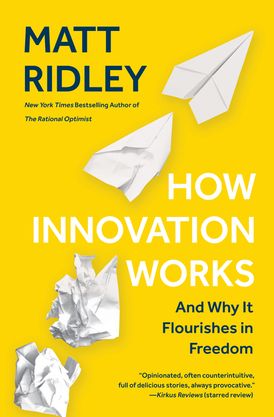, 3 min read
How Innovation Works (book review)

I read How Innovation Works by Matt Ridley in a few hours. It is a delicious book.
Ridley distinguishes invention from innovation. The inventor creates something new, the innovator applies the novelty to change the world. Jeff Bezos innovated with his Amazon site, but he may not be much of an inventor. Scientists often invent new “things” but they often fail to innovate.
Innovation is often quite positive and Ridley attributes much of the large gains in wealth and well-being that we have known. So what makes innovation possible, or what causes innovation?
Ridley does not know exactly. However, he identifies some conditions that favour innovation:
- You need some freedom, the freedom to try new enterprises, the freedom to apply new ideas.
- You need some wealth. Necessity does not reliably drive innovation according to Ridley.
- You need the ability to make mistakes and learn quickly from them. Innovation does not happen overnight from the brain of a genius. It is a deeply iterative process.
Thus we get little innovation in the nuclear industry because it is difficult to get approval for a new nuclear power plant. And it is difficult to experiment. However, we get a lot of innovation on the Web where anyone can try to offer a new service and where it is easy to iterate quickly.
What is the role of government in innovation? It is often believed that government drives innovation. However, it does not match the historical record. Until sometime in the XXth century, governments did not have any idea that they could promote innovation. Yet innovation did occur. Furthermore, governments decided to adopt a laissez-faire policy with respect to the Web, which enables massive innovation.
When you look at how much difficulty the state has to even embrace innovation, you cannot believe that it is also the source of our innovation. Ridley, like myself, is pessimistic regarding government interventions like patent protections. We get more innovation when people are free to iterate and reuse ideas. Furthermore, focusing the innovators on patents takes time and money away from innovation.
I am also skeptical of the ability of research grants to spur innovation, even when said grants and tied to industry collaboration. I do think that governments can play a positive role, besides protecting free enterprise and free markets: governments can issue prizes and contracts. For example, NASA may not be able to innovate and get us in space cheaply. However, NASA can offer contracts to space companies. Governments could similarly encourage progress in medicine by giving prizes to the first innovators to reach certain milestones. For example, we could give 10 billion dollars to the first team to stop cognitive decline in Alzheimer’s patients, at a reasonable cost. I get the feeling that Ridley would agree.
Research grants tend to favour the incumbents. Research prizes are more likely to reward innovators.
It is true that the innovators are not rewarded for nearly all of the wealth that their innovation generate… but innovations are frequently a team sport. We may think that only the Wright brothers invented the aeroplane and made it work, leading to all the marvellous innovations… but many people had a hand in their work. They corresponded with enthusiast who were experimenting with planers. They had an employee design a very light and powerful engine. It is not clear that by trying to ensure that innovators get a larger share of the benefits, we get more innovation and this assumes that we innovators are always fairly identified. Is the first people to patent an idea the sole innovator?
Where will innovation happen in the near future? The answer that seems obvious today, and the one that Ridley goes to is China. China seems uniquely able to try new things as far as technology and industry goes. Ridley is not pleased by this likely outcome given that China lacks democracy. Instead, Ridley believes that we could renew our habit of creating innovation elsewhere if only we choose to.